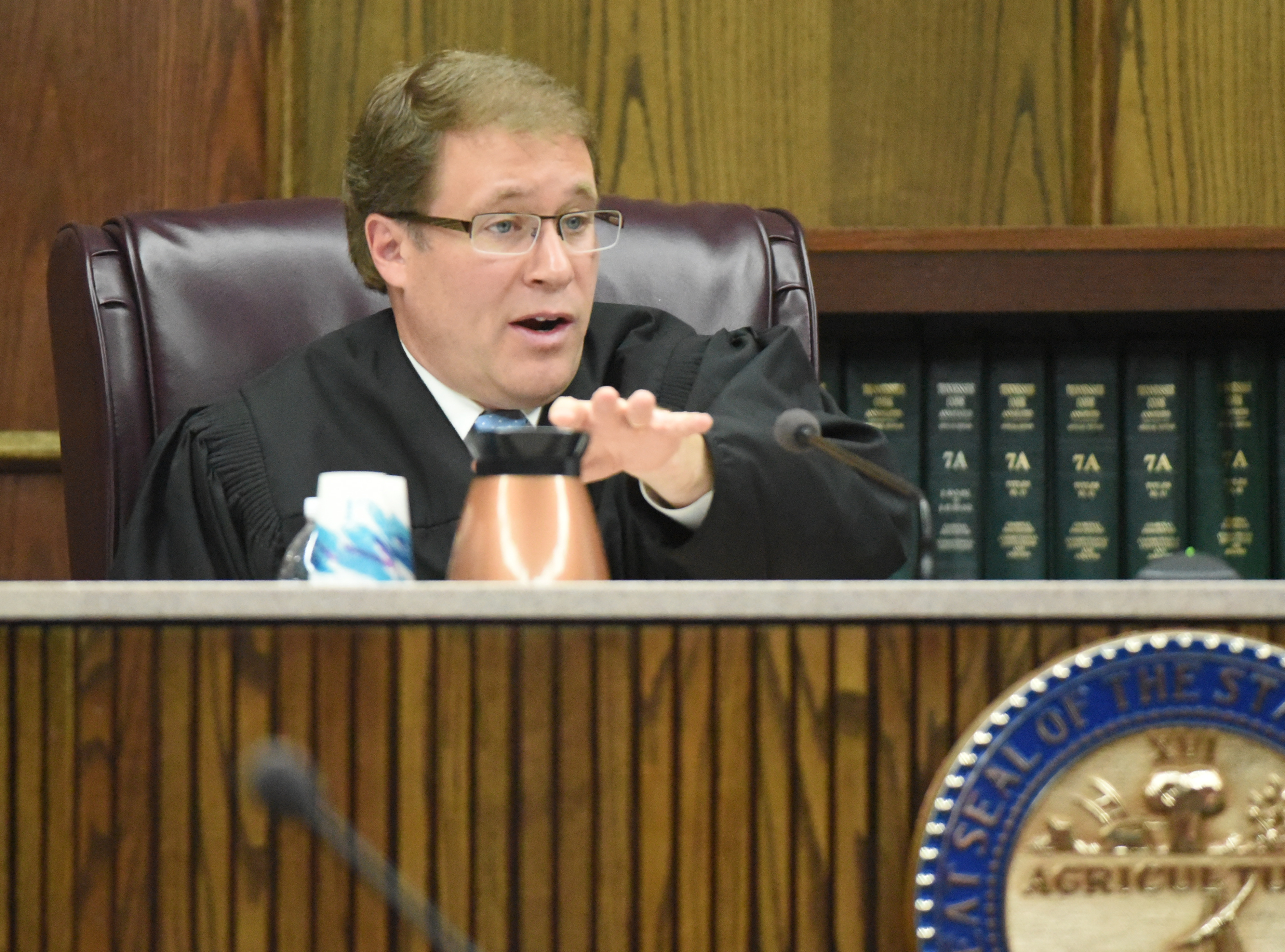Based on the results of "gang injunctions" in other cities nationwide, some Chattanooga defense attorneys want more time to study a similar proposal here that pits people's personal freedom against increased community security.
The "safety zone" proposal crafted by District Attorney General Neal Pinkston would ban 31 men named as members of the Gangster Disciples and Grape Street Crips from associating with each other in East Lake.
Pinkston filed the petition for injunction last week to much fanfare and criticism. He's asking Hamilton County Criminal Court Judge Barry Steelman to approve it during a 1:30 p.m. hearing today. The court order would restrict specific behaviors from the targeted men, and the DA says it would give law enforcement a tool to make East Lake safer.
Some defense attorneys, though, object they've been blindsided, given only a week to look at a controversial proposal Pinkston and police have worked on since April. They say the injunction would violate people's constitutional right to freedom of association, and that similar actions in other cities have been used largely against black men who didn't have a chance to defend themselves in court.
The 31-page petition would essentially make the Gangster Disciples and Grape Street Crips a public nuisance, banning them from a nearly two-mile, high-crime region of East Chattanooga. All but one man is black, mugshots and records show.
If approved, the petition would levy a $50 fine and 30 days of jail time for any targeted men who violate 11 listed activities, most of which are already illegal. Those include owning graffiti equipment, drinking alcohol, possessing guns and drugs, signaling the arrival of police, and hanging out with other accused gang members.
Both Steelman and Pinkston declined to comment Friday.
But one local defense attorney said such an injunction would open the door to illegal police searches, racial profiling and harassment of people who are simply affiliated with the 31 listed men.
"I understand Pinkston's desire to use every tool at his disposal to combat violent crime," said attorney Chrissy Mincy, who plans to ask for a reset court date since she's representing several of the men.
However, she said, "I think a number of constitutional issues need to be raised before an injunction like this goes down."
It's an issue playing out in several violence-plagued cities across the nation.
In the last year alone, defense attorneys in Texas and California have either shut down or settled "gang injunctions." Meanwhile, a public defender in Memphis has contended authorities punished her client before he knew he was included in one such order.
In a motion filed in Shelby County General Sessions Court on April 18, Assistant Public Defender Barbara Sidelnik summed it up this way:
"The injunction order amounts to punishment based on [gang] association, and nothing else."
***
Houston, Texas, attorney Monique Sparks got involved in a gang injunction battle in October 2015 when a constable walked into an unrelated criminal court proceeding and handed her and her client a document.
"When I opened it and started reading it, I saw a list of 92 men, a lot of men I knew," Sparks said. "Everybody on the list was black. There were no women. It was just egregious."
Sparks continued reading about the proposed injunction: The listed men couldn't stand in the neighborhood, walk in the neighborhood, talk in the neighborhood, go to the store, the pharmacy, the probation office.
"I started calling around," Sparks said, "but nobody had ever heard of it."
Further research revealed that Harris County authorities had already filed three other civil petitions against gang members to create "safety zones."
As Sparks noticed, many of the men never showed up to court to argue against the accusations. Because it was a civil matter, the accused men also weren't entitled to attorneys to argue their names didn't belong on the petition. In a criminal case, a judge appoints an attorney when an accused person can't afford one.
Others were in prison, she said, which meant they couldn't get to court.
The judge found the no-shows in default, meaning the restrictions in the petition applied to them even though they didn't have the chance to object.
So, Sparks said, the men could be picked up and prosecuted even if they didn't know they were doing something wrong.
"That means if they say you can't go into the two-mile square radius, you can't do it," Sparks said. "And if you go there, then not only have you committed a civil violation, then you've also committed a criminal violation. And they can charge you with trespassing and violation of the gang injunction. It basically puts you in a bind in two different courts."
Last week, Tom Castelli, the legal director of the American Civil Liberties Union in Tennessee, said he was concerned about that very issue. He likened Pinkston's petition to "broken-windows" policing, a controversial strategy where authorities charged people in violent areas with petty accusations to dissuade them from further crime.
Fearing similar problems in Houston, Sparks rounded up a six-person team to fight the proposed injunction in Harris County.
They wrote letters to everyone on the petition informing them of their rights; organized block walks with the ACLU; attended churches to spread the word; appealed to politicians and commissioners; tried to move one of the cases to federal court to send a message to state prosecutors; got involved with Black Lives Matter; and challenged the criteria that made people gang members in the eyes of law enforcement in the first place.
"You never gave these guys a chance," one of the attorneys, Drew Willey, said of the accused gang members, "and now you created a whole new law to throw them in jail while using taxpayer money? Instead, why don't you use the money to fix the thing?"
Eventually, Harris County removed about 40 men from the list who presented no immediate threat, Sparks said. The defense team began deposing police officers to prepare for a trial in July that could lead to a permanent injunction.
Before that happened, though, the Harris County district attorney announced she and the city attorney were dropping the temporary injunction and funneling money into education programs to help anyone grappling with gang membership.
Now, Sparks said, she meets once a week with representatives from the mayor's office, the district attorney's office, Black Lives Matter, and a former gang interventionist to continue brainstorming new community policing directives and education opportunities.
"One of my major arguments was, all you do is take," Sparks said. "If you really want to help, there's other ways."
***
In Los Angeles, where he said nearly 50 gang injunctions are in place, civil rights attorney Olu Orange fought the accusations on the back end with a class-action lawsuit in federal court in 2011.
He said his client, Christian Rodriguez, was arrested in a housing project for violating curfew in June 2009. Although Rodriguez was neither an associate nor a gang member, he was included in the injunction because of an older brother's ties to the group.
The federal judge, Orange said, was a former prosecutor who studied law in Chicago and understood the social desperation that drives people into gangs and violence. He encouraged the attorneys to craft a settlement that benefited the people affected by gang violence, Orange said.
And they did.
In March, the city of Los Angeles agreed to pay as much as $30 million to assist thousands of people subjected to unlawful curfews included in city gang injunctions, news reports show. Orange said he was pleased the city agreed to pay for job training since education and secured income are the main escape routes from a cycle of violence.
He called injunctions a "horrible concept" and cautioned prosecutors against civil actions that curtail personal freedoms.
"It costs money to implement these injunctions, in terms of serving them, enforcing them, and locking people up. And then, at the same time, it also saps money out of the tax base. Because you effectively remove people from being positive contributors. It's a double whammy."
***
Aside from constitutional concerns, Chattanooga defense attorneys are worried about the process officials use to summon people to court.
As Mincy pointed out, the petition says criminal gangs are "legal bodies" capable of being served like an "unincorporated association."
She said a gang is not a corporation and cannot be treated like one. She also said the petition relies on a California law, not a Tennessee statute, to define an unincorporated association.
"So I don't think that case actually stands for the proposition the district attorney is asserting in there," Mincy said Friday.
There are going to be two public notices to let the accused men know about the injunction hearing. Mincy and others said that doesn't meet the requirements to legally notify someone about a court date.
***
Kevin Muhammad, of the Nation of Islam in Chattanooga, has opposed the proposed injunction from the start.
Though he understands the plight of people stuck in East Lake because they cannot afford to move, like Ruthie Wright, who said last Monday she walks her 17-year-old granddaughter to the bus stop every morning because of shootings, Muhammad said desperate times do not call for desperate solutions.
He plans to attend today's Criminal Court hearing and said he discussed the proposed safety zone with some of the accused men and their family members.
"People want a solution to this problem," Muhammad said. "What they do not want is their loved ones being subjected to more prison time and pushing one problem to another neighborhood.
"Because if they're not going to go to East Lake, then they're going to another neighborhood. And then we're going to draw another safety zone. Then they'll go to another neighborhood. And then we'll draw another safety zone."
Contact staff writer Zack Peterson at zpeterson@timesfreepress.com or 423-757-6347. Follow on Twitter @zackpeterson918.


